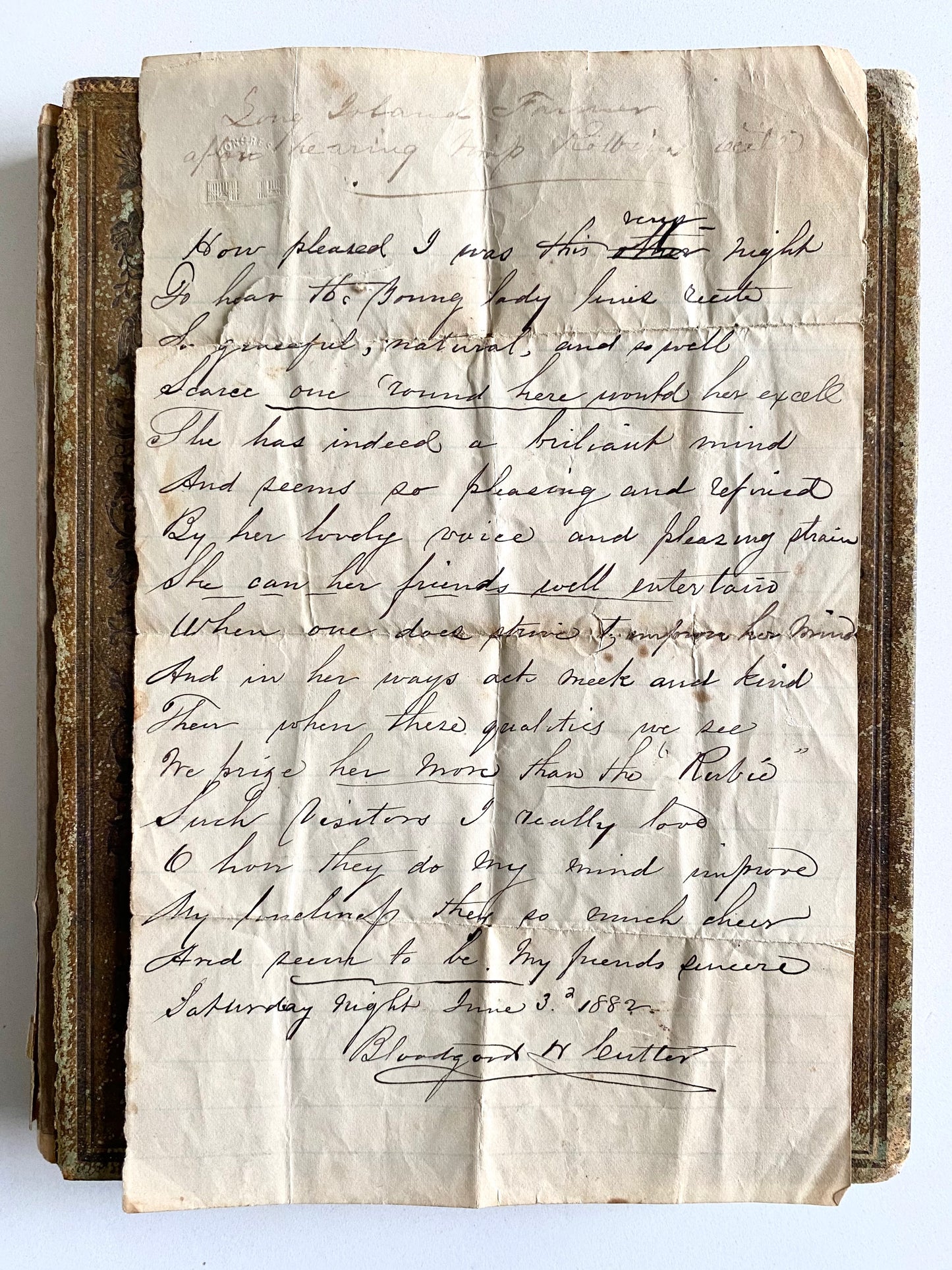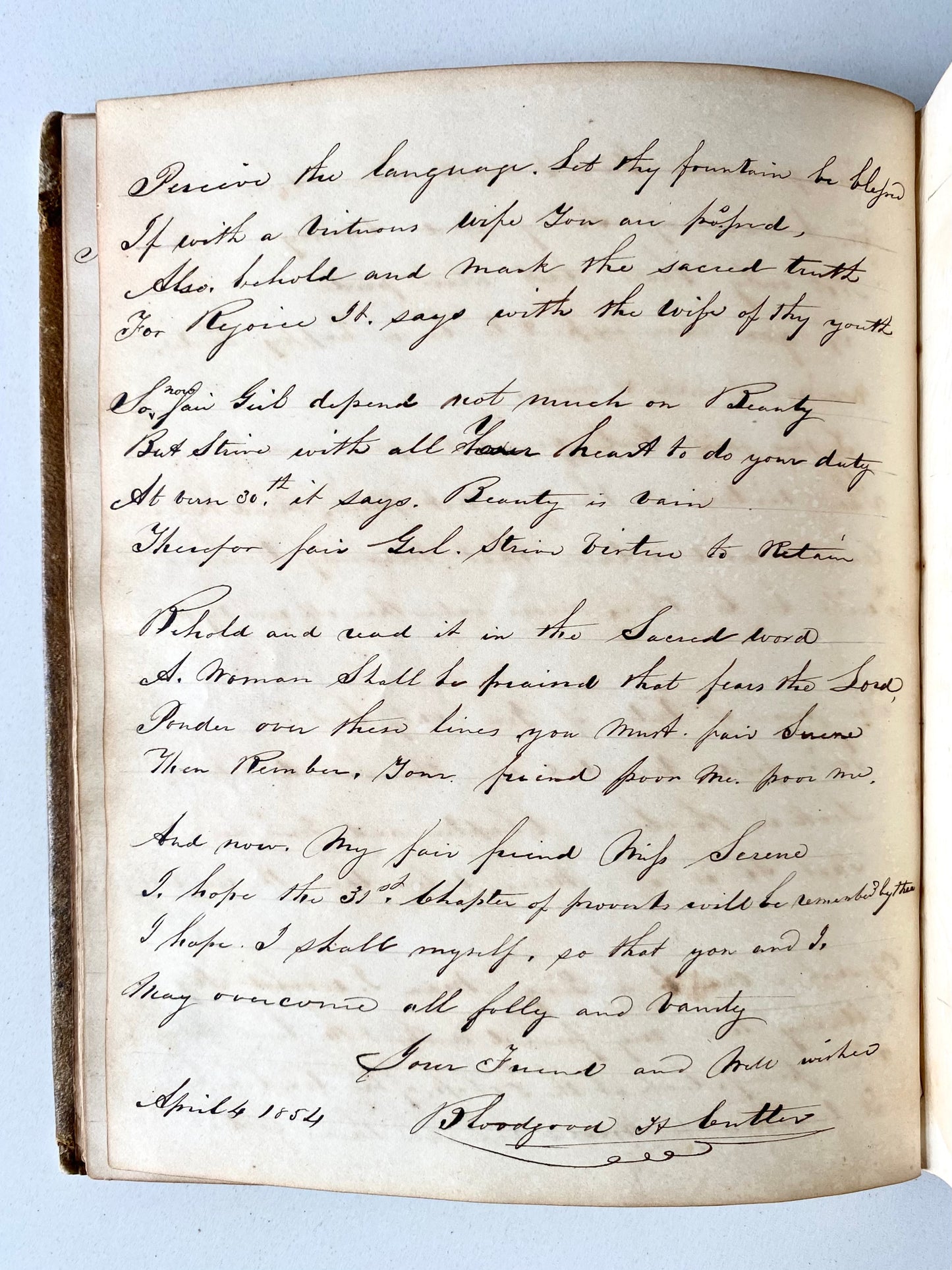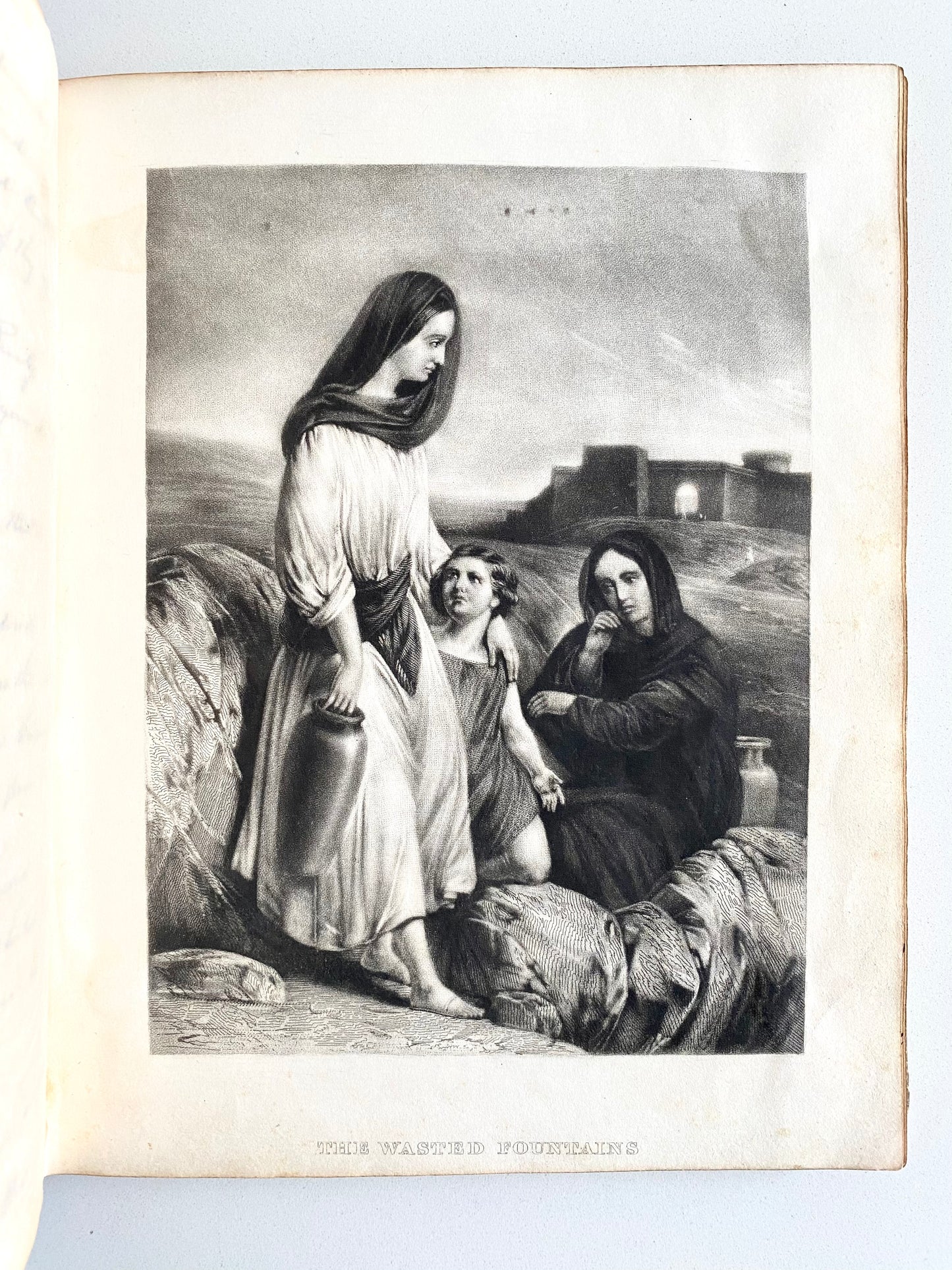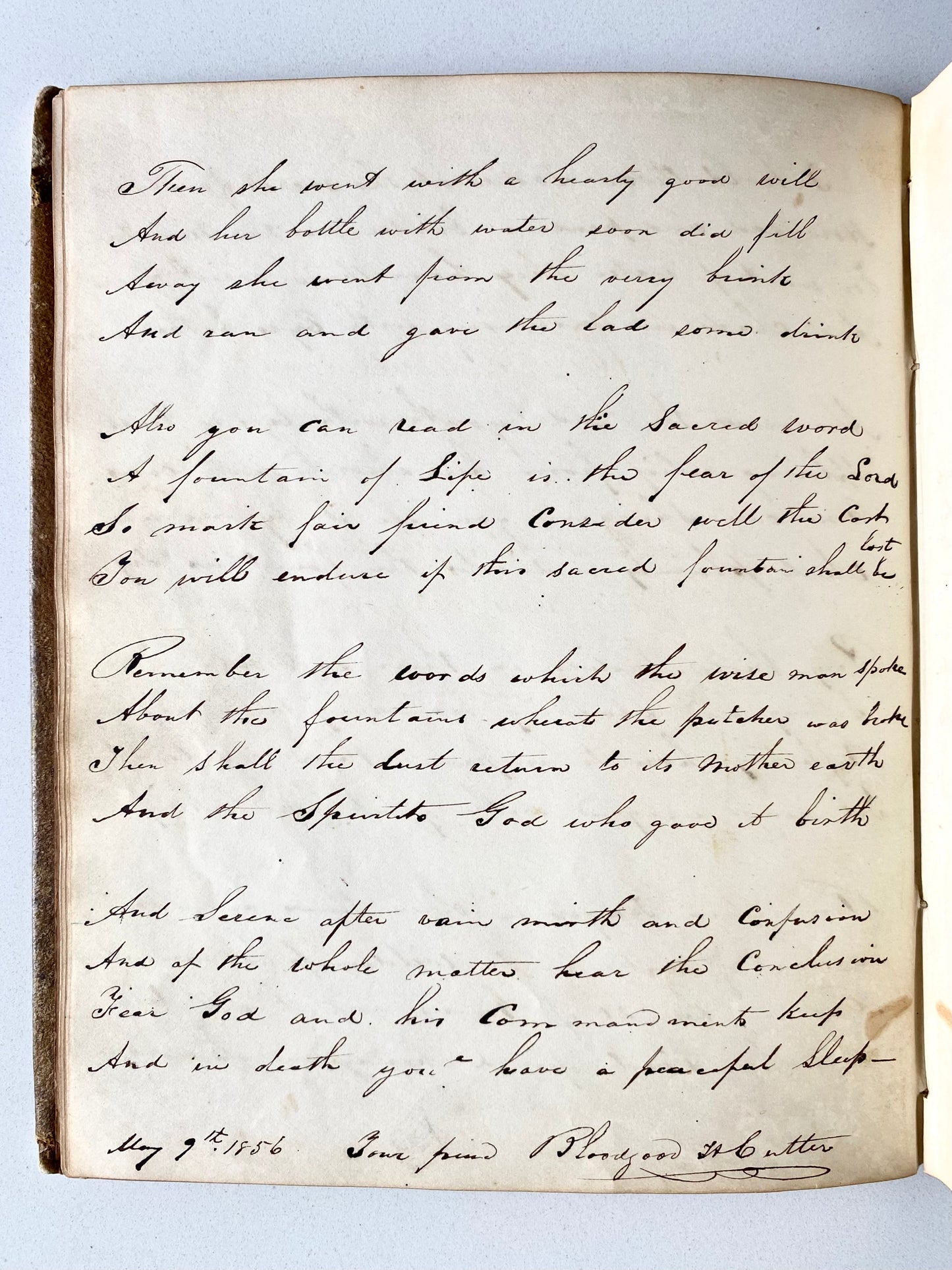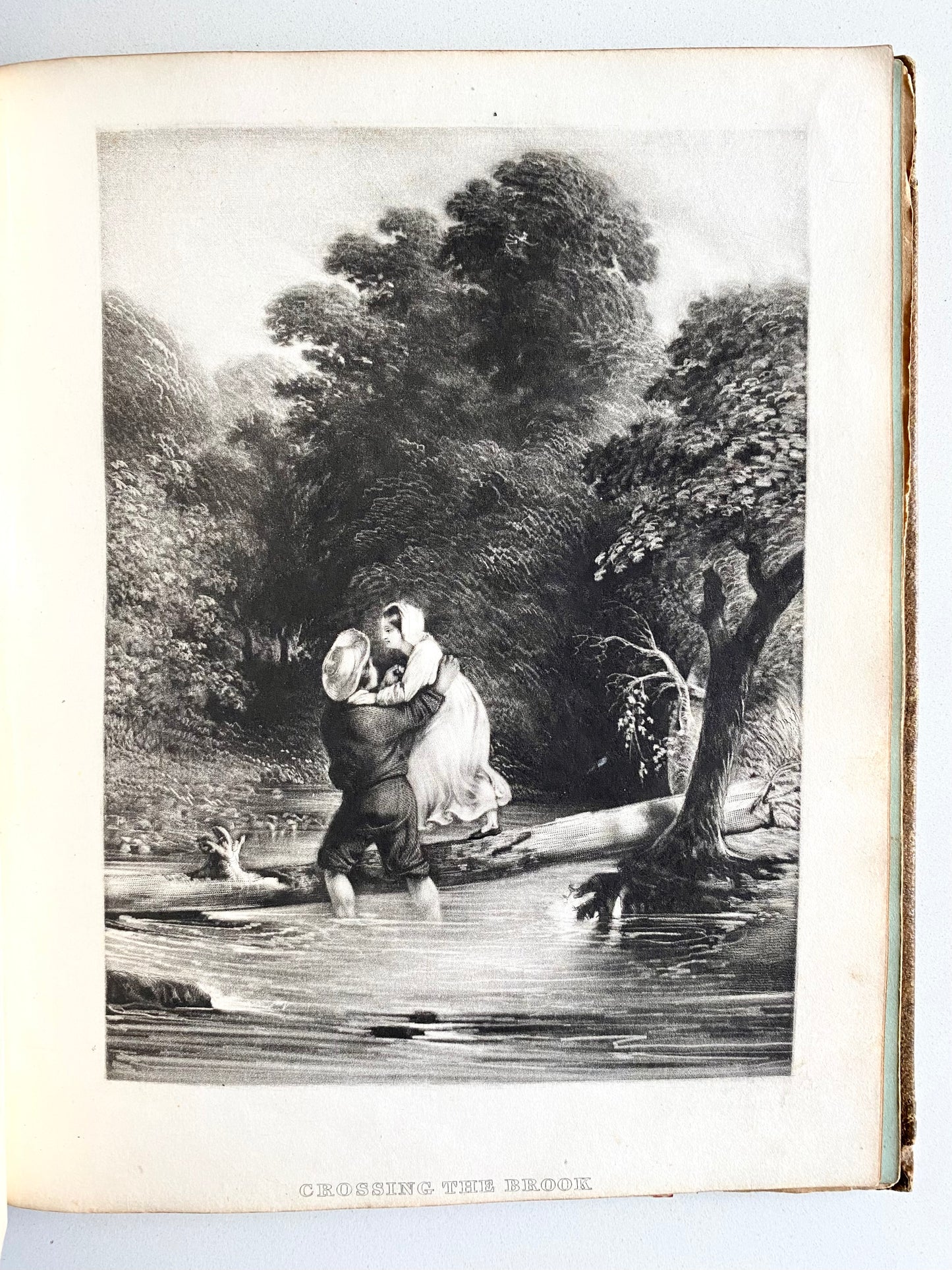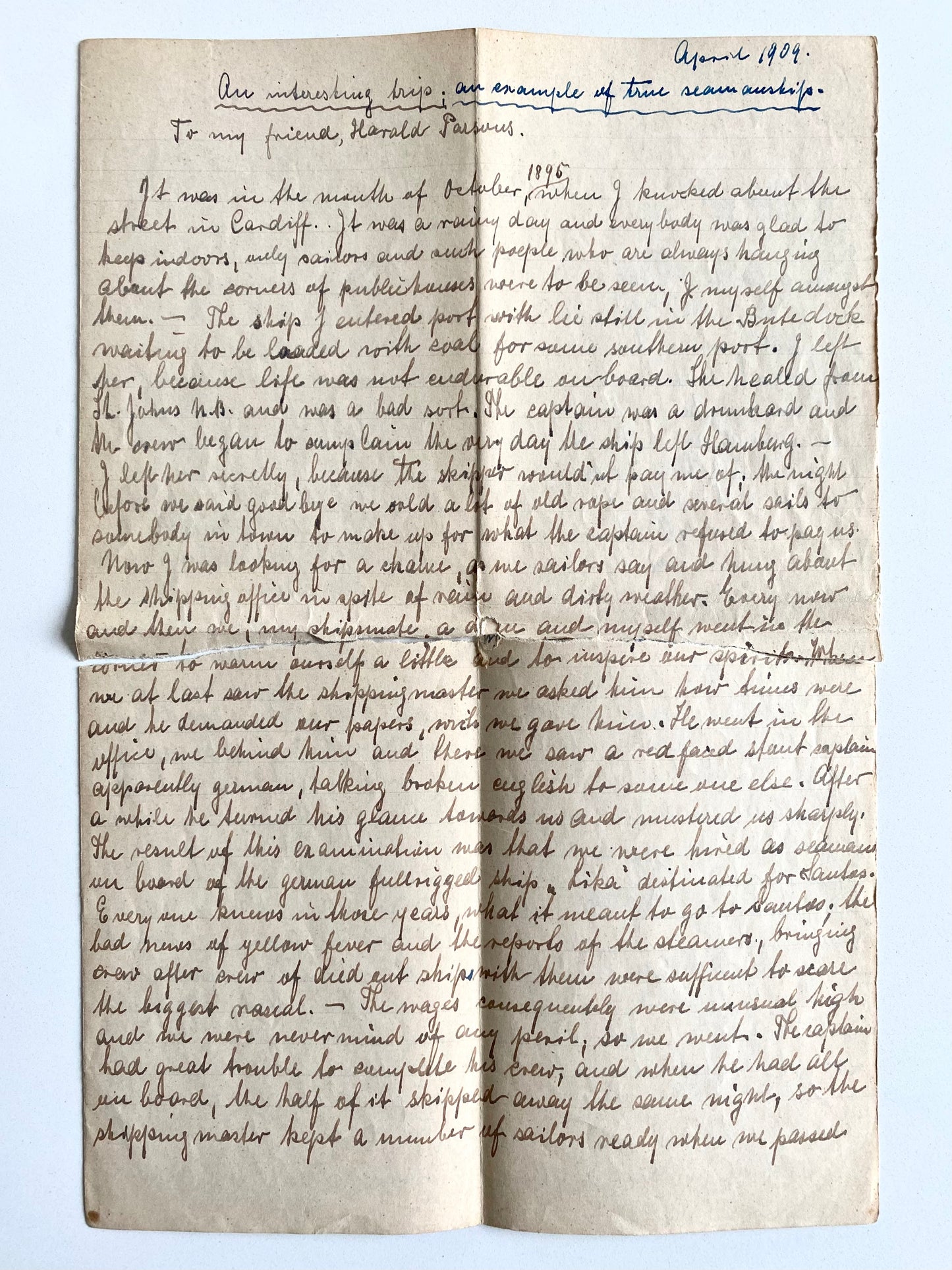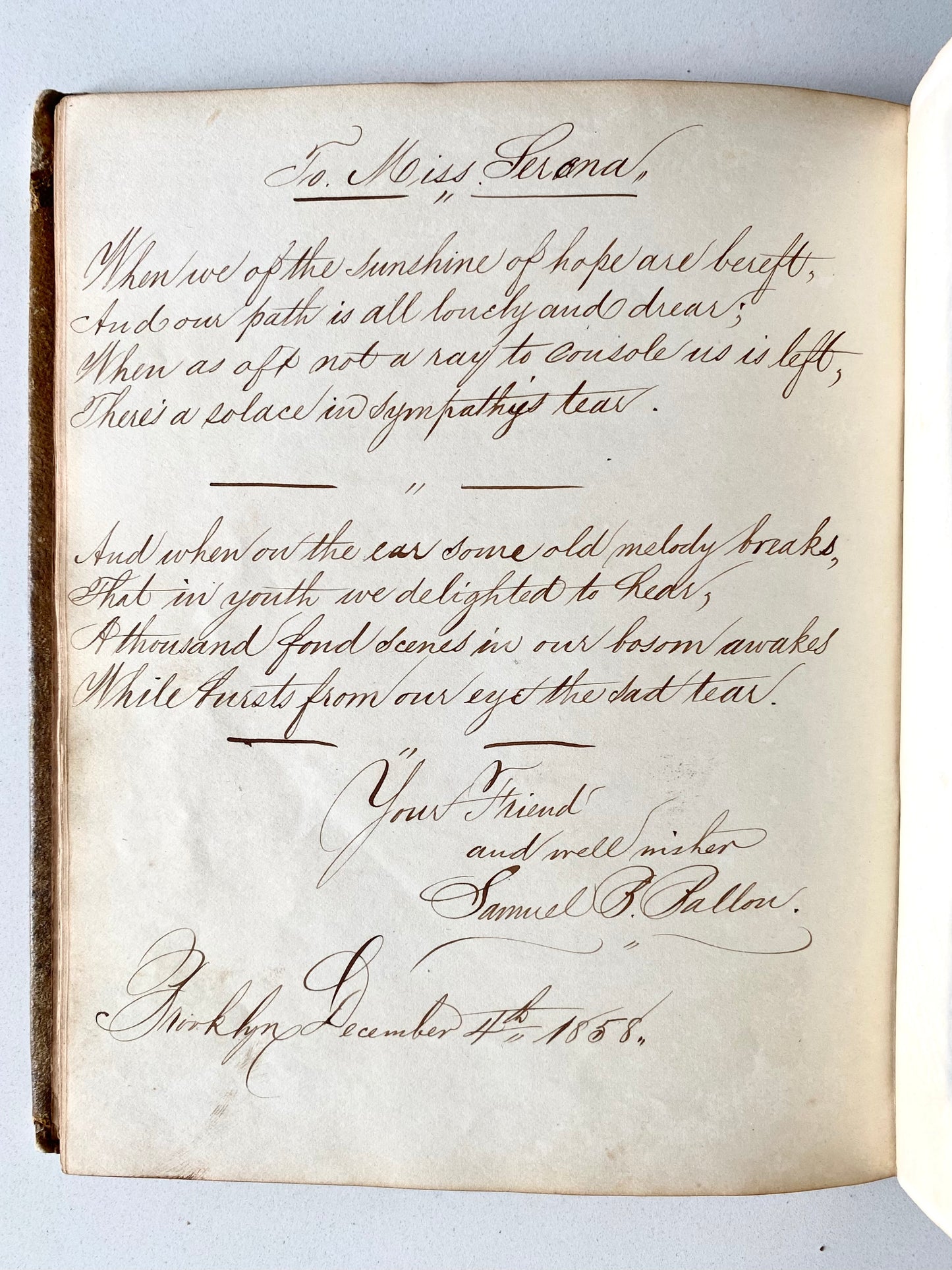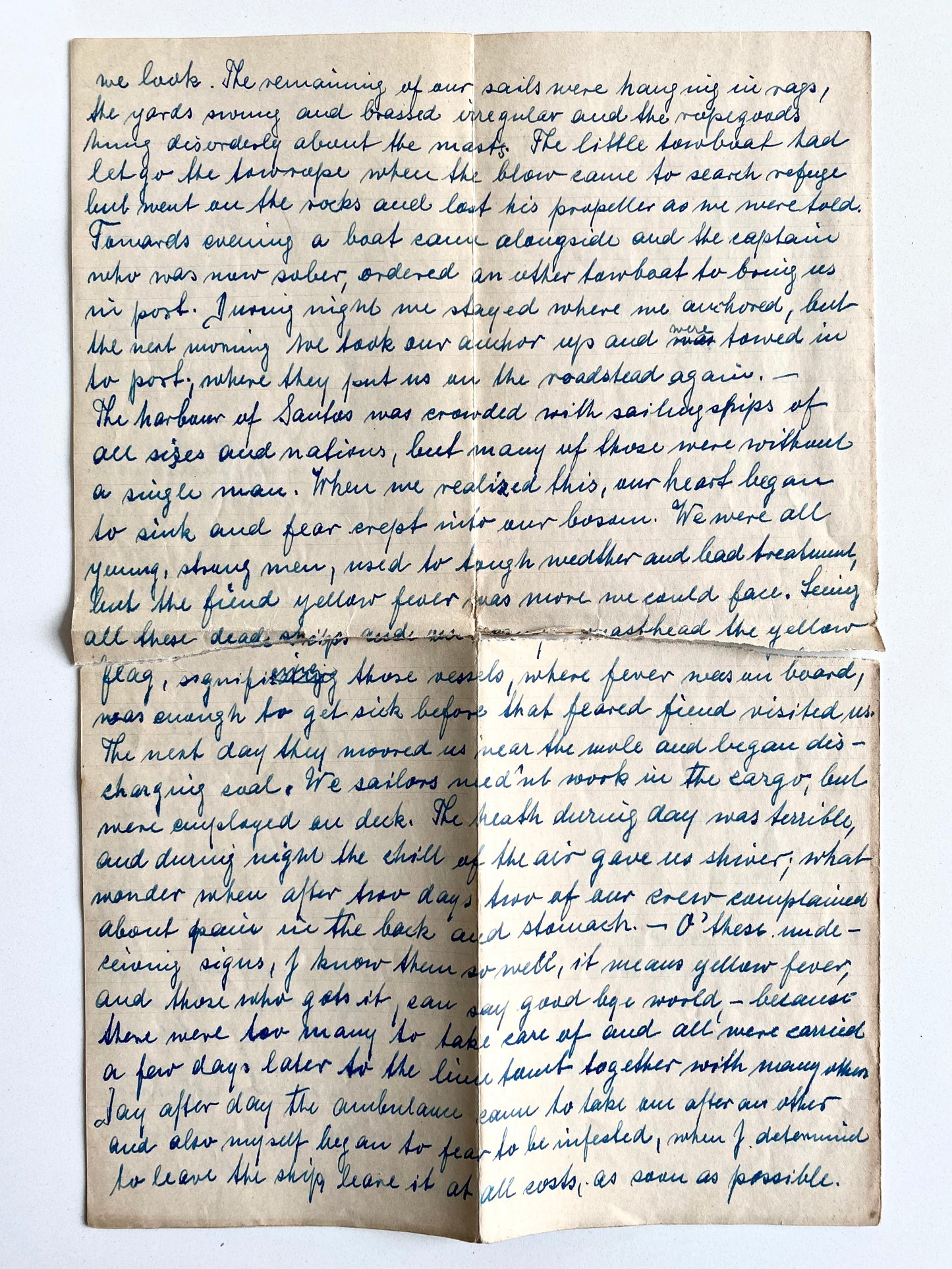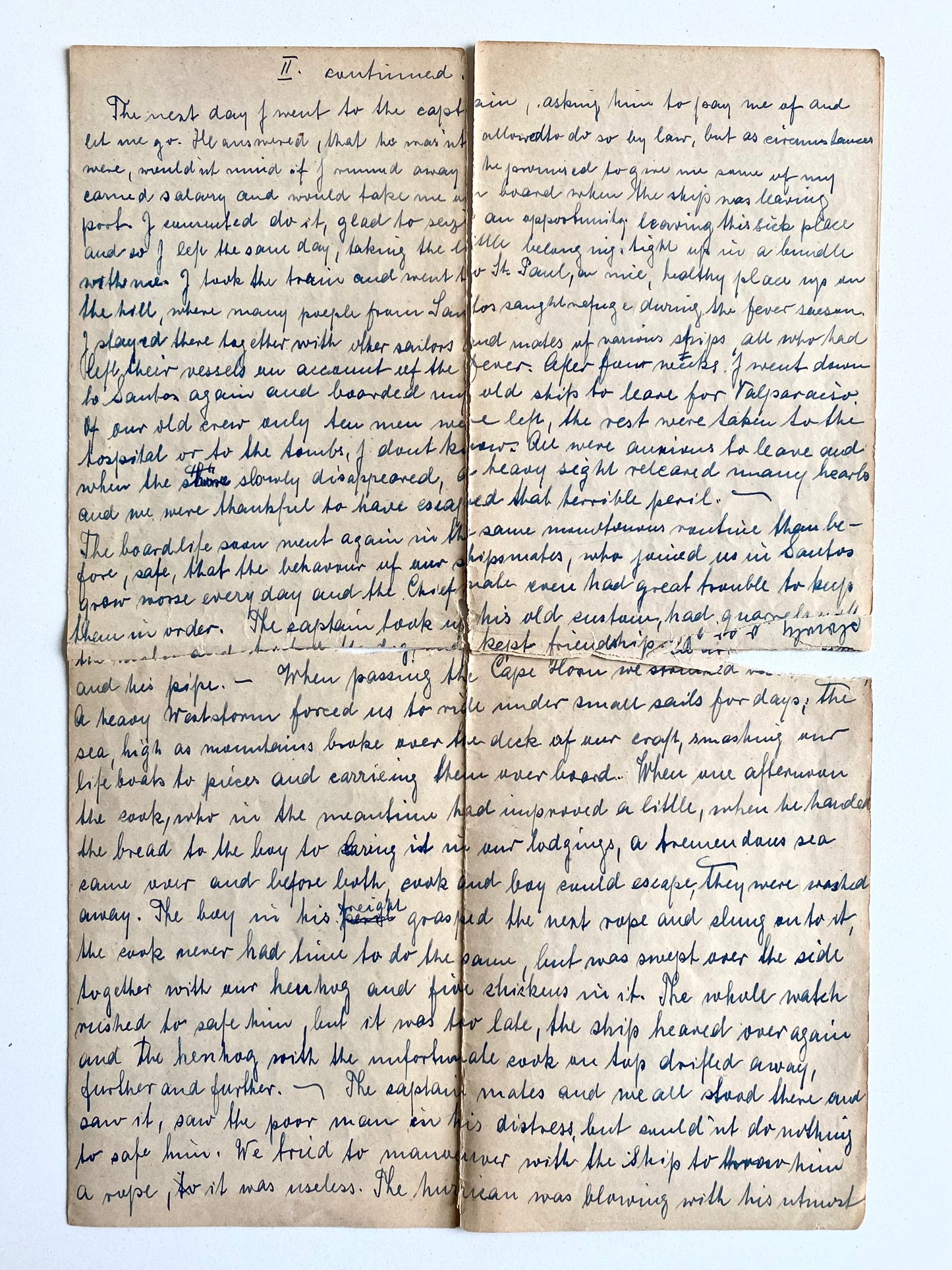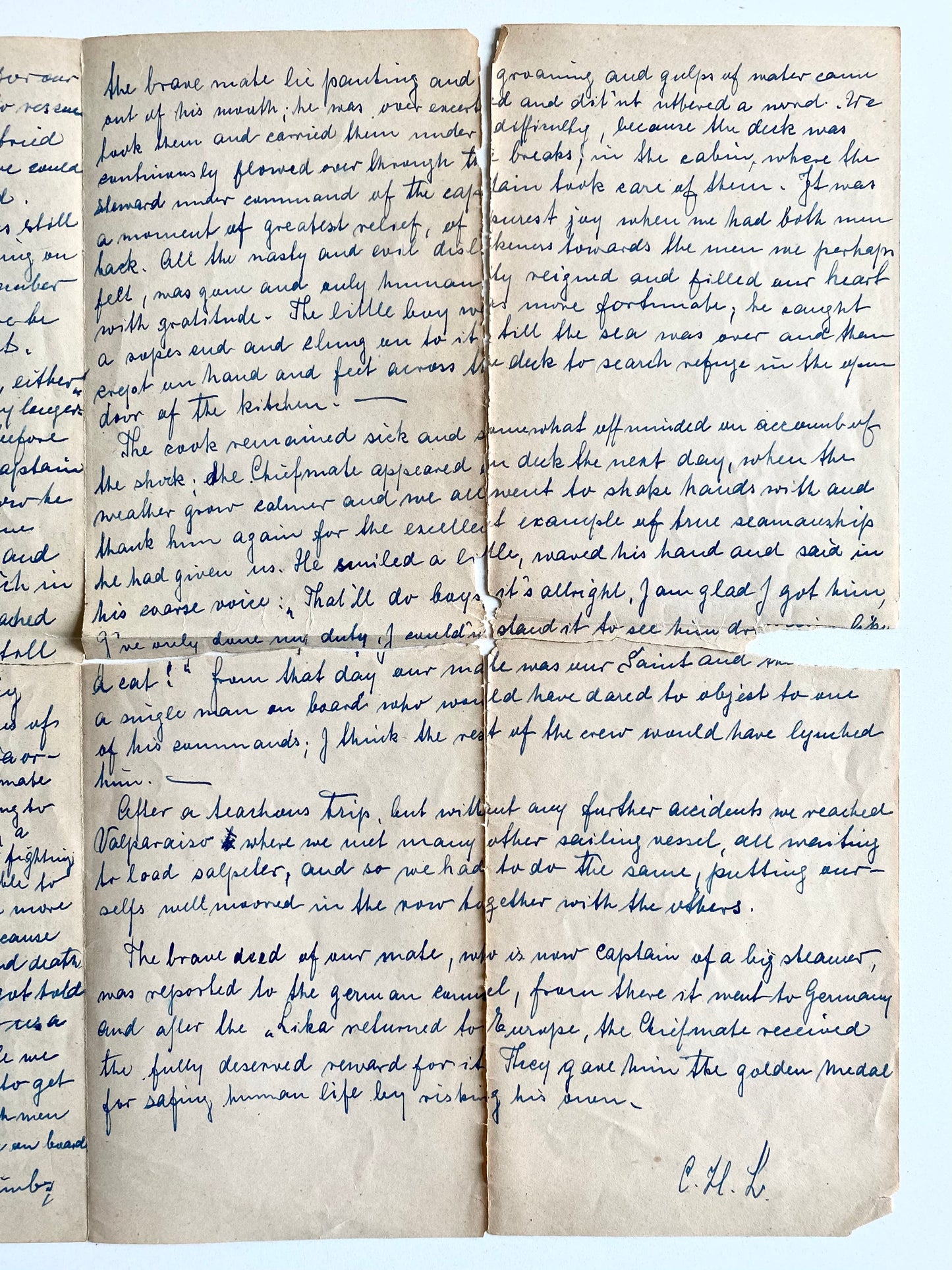Specs Fine Books
1850 BLOODGOOD CUTTER. Album with Unpublished Poems by Important Long Island "Farmer Poet."
1850 BLOODGOOD CUTTER. Album with Unpublished Poems by Important Long Island "Farmer Poet."
Couldn't load pickup availability
Album belonging to Serena Lambertson of Great Neck New York with multiple unpublished manuscript poems by the Long Island Farmer Poet and friend of Mark Twain's, Bloodgood Haviland Cutter.
Befitting his name, it would be difficult to find a more colorful character in all Long Island history.
He had a limited education, mainly, as he often noted, derived by reading the Bible. Throughout his life it was a common sight on Flushing, New York streets to see him there, holding an open Bible in his hand and admonishing other persons by reading some passage to them while on their way to the market.
He married well, eloping with a daughter of the well-propertied Allen family of Great Neck. Cutter later acquired the Allen mill, which there-after was called Cutter's Mill *and after which Cutter Mill Road in Great Neck is named). His main occupation was farming, but Cutter also became quite a propertied landowner, eventually owning numerous parcels in Great Neck as well as large blocks of land north of the railroad station and in Plandome Heights. During the course of his business dealings he developed a reputation for honesty and sound business acumen.
He also developed a reputation for being a "character." Perhaps it was his old-fashioned clothes, his country accent, or the poetry that he wrote and distributed. His reputation was sealed when in 1867 he booked passage for a 5-month trip to the Holy Land, Mark Twain turned out to be one of the passengers, and Cutter found himself immortalized in Twain's book Innocents Abroad as the character the "Poet Lariat." This is how Mark Twain described Cutter in his notes for the book:
"He is 50 years old, and small for his age. He dresses in homespun, and is a simple minded, honest, old-fashioned farmer with a strange proclivity for writing rhymes. He writes them on all possible subjects and gets them printed on slips of paper with his portrait at the head. These he will give to any man that comes along, whether he has anything against him or not."
For the rest of his life Cutter relished being referred to as the "farmer-poet" or the "Poet Lariat" and told of his acquaintance with Mark Twain to anyone he met. In 1886 he even had a 500-page book of his poetry published by a vanity press entitled The Long Island Farmer's Poems.
He died in 1906 at the age of 89; a tall granite gravestone marks his burial site in the Zion Episcopal Church cemetery in Douglaston. Most of his estate, valued at over $500,000, was willed to the American Bible Society, including the Plandome Heights lands. His huge collection of books and antique furniture was sold at auction.
The present album belonged to a young friend of his, one Miss Serena Lambertson, also of Great Neck. It is full of original poetry by New York locals from Brooklyn, Great Neck, Jersey City, Flushing, etc. Importantly, it contains a good quantity of previously unpublished works by the Poet Lariat himself, and in his hand.
Contents include:
To Serena, dated Little Neck, October18, 1853. 14 lines, not published. “This album’s like the rural walk where Beauteous flowers are seen | There’s every hue the eye to please adorning life sweet green,” etc.
To Serena, dated October 15, 1853. 4 lines, not published. Initialed M. Y. L.
To Serena, undated. 4 lines, not published. Initialed A. J. L.
Dated December 20th, 1853, 4 lines, not published. Initialed M. P.
Dated to Whitinsville, October2, 1857. 6 lines, not published, signed by E[lizbabeth] Whitin, probably Elizabeth Whitin [born Pratt], who married into the prominent Whitin family. “In after years, as thou, perchance | As thoughts of auld lang syne arise | Midst other scenes, shalt cast a glance | Along these pages, should thine eyes | Rest on this tribute, think of me | Think kindly, as I shall of thee.”
To Serena, undated, but from Fanny E. Hicks [1797-1854] of Flushing, Long Island. An extensive inscription in verse, in 24 lines, penned just before her death. Unpublished. Deeply devotional in tone. Descendent of the early Hicks / Hix family of Long Island.
To Serena, April 4, 1854. 48 lines, 12 stanzas. By Bloodgood H. Cutter, signed “Your friend . . . Bloodgood H. Cutter.” In part:
Therefore fair Girl I must warn thee
To beware of Folly and Vanity
Not only that but also pride
If you ever expect to be a happy bride.
By this fair Girl you will perceive
That virtue is the greatest prize, mind that, believe
Cherish and retain that Heavenly treasure
Twill be to thee, more value than all worldly pleasure.
The price of Virtue if you only look
You’ll find it recorded in the Sacred Book.
Look in the above Chapter and you’ll see
That it is of more value than the rare ruby.
Of such a one to a young man I would say
Marry her my friend without the least delay
For proof look at the 5 chapter of Proverbs & behold
A treasure far more valuable than gold.
Etc.
To Serena, May 9, 1856. 44 lines, 11 stanzas. By Bloodgood H. Cutter. Based on an engraving in the album entitled, “The Wasted Fountains.” Unpublished. In part:
Remember Hagar in olden times and son
For want of water in the wilderness was near undone
Read in the 21 of Genesis and it will tell
How the Lord opened her eyes and she saw a well
Then she went with a hearty good will
And her bottle with water soon did fill
Away she went from the very brink
And ran and gave the lad some drink.
Also you can read in the Sacred Word
A fountain of Life, is the fear of the Lord
So mark fair friend, Consider well the cost
You will endure if this sacred fountain be lost.
Etc.
To Miss Lamberton, dated to Little Neck, July 23, 1855. 2 lines in Latin, signed W. C. Casey.
To Serena, dated Jersey City, November 28, 1853. 8 lines. A published sentiment. Signed “A Friend.”
To Serena, dated Flushing, October 28, 1853. Again from Fanny E. Hicks [see above]. An unpublished 12 line poetic remembrance.
To Serena, unsigned or dated save, “P.” A 16 line unpublished very accomplished poem on friendship. Likely someone of the Pillsbury family.
An 8 line unpublished poem dated to New York, June 1854, and signed Pillsy [almost certainly for Pillsbury]
To Serena, dated to Jersey City and signed “J. H. M.” 8 lines extracted from Samuel Francis Smith.
To Serena, undated and signed only, “A Good Adviser.” 12 lines, referencing Bloodgood’s poem on another page and adding that Bloodgood neglected to mention that, “You must change or go to Perdition.”
Another 8 line unpublished poem, dated June 1854 an signed Pillsy.
To Serena, signed only “A Friend.” 10 line poem of a devotional nature. Apparently original.
To Serena, dated to Brooklyn, March 27, 1854, and signed A. M. C. An 8 line unpublished poem on flowers as a metaphor for life and death. Apparently original.
To Serena, dated Dec 20, 1853 and signed by M. A. P. 8 lines, apparently unpublished.
To Serena, undated, but in the hand of and igned by the wife of Bloodgood, Emiline Cutter. 32 lines. In full, from Frances Osgood’s The Flower and the Gem.
He did not say he loved me;
But Oh! He used to bring,
To deck my braided tresses,
The fairest flowers of spring.
He did not say he loved me;
But in his earnest eyes,
I thought I saw the secret,
A thousand times arise.
He did not say he loved me;
He did not breath a vow,
I needed no confession -
I read it on his brow.
I met it in his glances;
I heard it in his tone;
I asked not if he loved me;
I felt he was my own.
He did not say he loved me;
Yet, oh he used to sing,
Such songs as thrill the spirit,
While feeling tunes the string!
But false his dark eye’s smiling;
And false my dream, as brief;
Alas, for man’s beguiling;
For woman’s fond belief!
He did not say he loved me;
Why did he ever bring,
To braid amid my tresses,
The token flower of spring.
Why did he look so fondly?
Why did he speak so low?
Oh, if he did not love me,
He should have told me so!
To Serena, dated to Little Neck, March of 1854. Signed by Emily M. Peters, 12 lines, apparently unpublished.
To Serena, signed by M. H. Jahne. 8 lines, unpublished, on meeting Serena at College.
To Serena, signed by Maria Louise Jahne, 8 lines, extracted, but not located as expansive as here.
To Serena [with a heart bearing the author’s initials]. A 16 line poem, not original, but modified or customized for Serena. Signed and dated to New York, January 14, 1854, by William F. Overocker.
To Miss Lambertson, signed by George W. Payne. 12 lines, extracted.
To Miss Serena, dated to Brooklyn, December 4th, 1858, an 8-line inscription signed by Samuel B. Ballou, of the prominent Ballou family and later an influential person in the newspapers of New York. The poem is extracted from the pages of the Universalist’s Union, in which his relative, Hosea Ballou was a prominent and regular feature.
And many others, including from family, another from Emiline Cutter, others from members of the Whitin family, many notated as being from “Flushing Institute,” etc.
Plus, neatly inserted are:
Lines Upon Hearing Miss Robbins Recite. Four stanzas. Dated and signed by Bloodgood Cutter, June 3, 1882. Unpublished. Folded with tears at folds. Complete.
A broadside by Cutter dated to 1869 of the exact variety described by Mark Twain. It has a woodcut of Cutter, a facsimile signature, and two poems, “People will Talk” and “On the Yacht Sappho”
A further broadside by Cutter of his poem, “On the Baptism of Wm. P. Douglas’s and Colonel Randolph’s Boys.”
An expansive 8 page near folio manuscript inscribed “An Interesting Trip. An Example of True Seamanship. To my Friend, Harold Powers.” It is signed at the end, C. H. L. The “L” being for Lambertson is a reasonably good guess. Totaling around 2,000 words, the account describes him getting work it seems aboard a ship in 1895 where the crew was a “bad sort,” the Captain being a drunkard, etc. The ship put out from Hamburg, he snuck off the ship before it left, and ended up aboard the Lika headed for Santos, where yellow fever was rife and was killing whole ships of people.
He recounts the “gloriously drunk” captain fighting with the one of the men, accounts of a German and Frenchy who fought every day, being caught in a storm in the middle of a bay surrounded by rocks and islands, receiving a terribly blow to the ship, “the red-faced captain with his big black dog standing on the poop deck and shouting like a mad man,” the harbor of Santos, “We were all young, strong men, used to rough weather and bad treatment, but the fiend yellow fever was more we could face. Seeing all these dead ships with yellow flag, signifying those vessels where fever was abord was enough to get before that feared fiend visited us,” he then goes on to describe an outbreak on board, deaths, etc.,
Complete, but torn horizontally on both bifolium sheets with some folds and letters obscured there.
Album is worn with front board detached and spine cover absent.
Share
